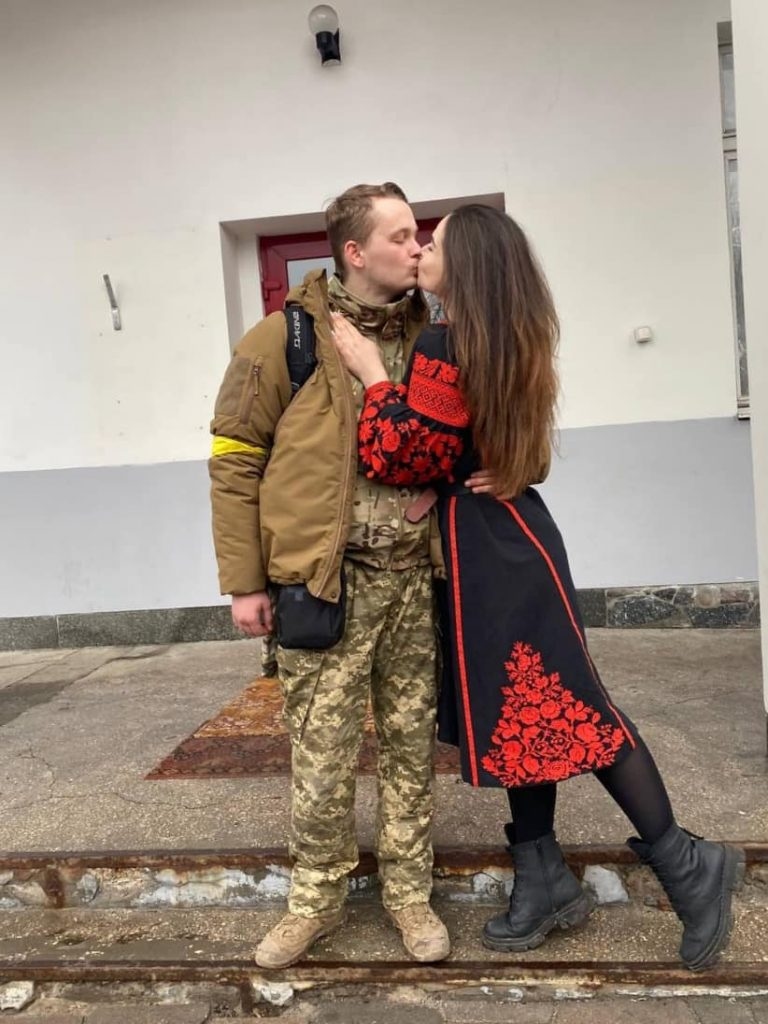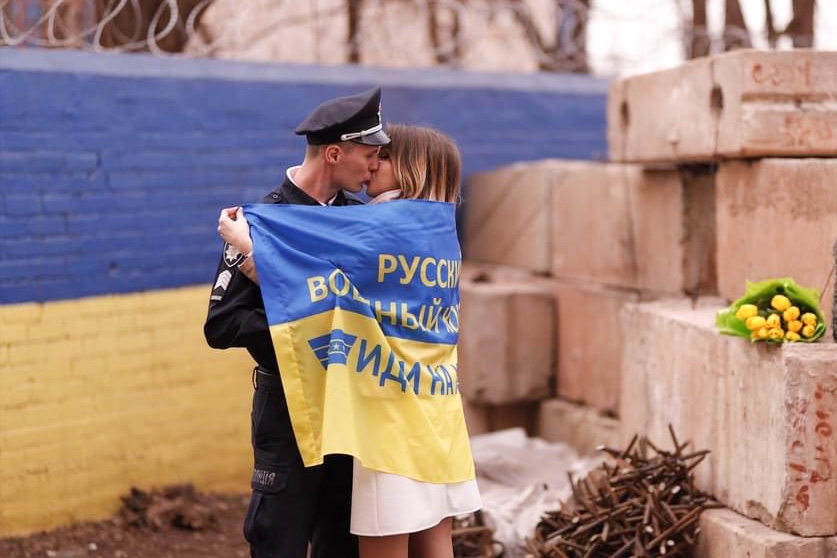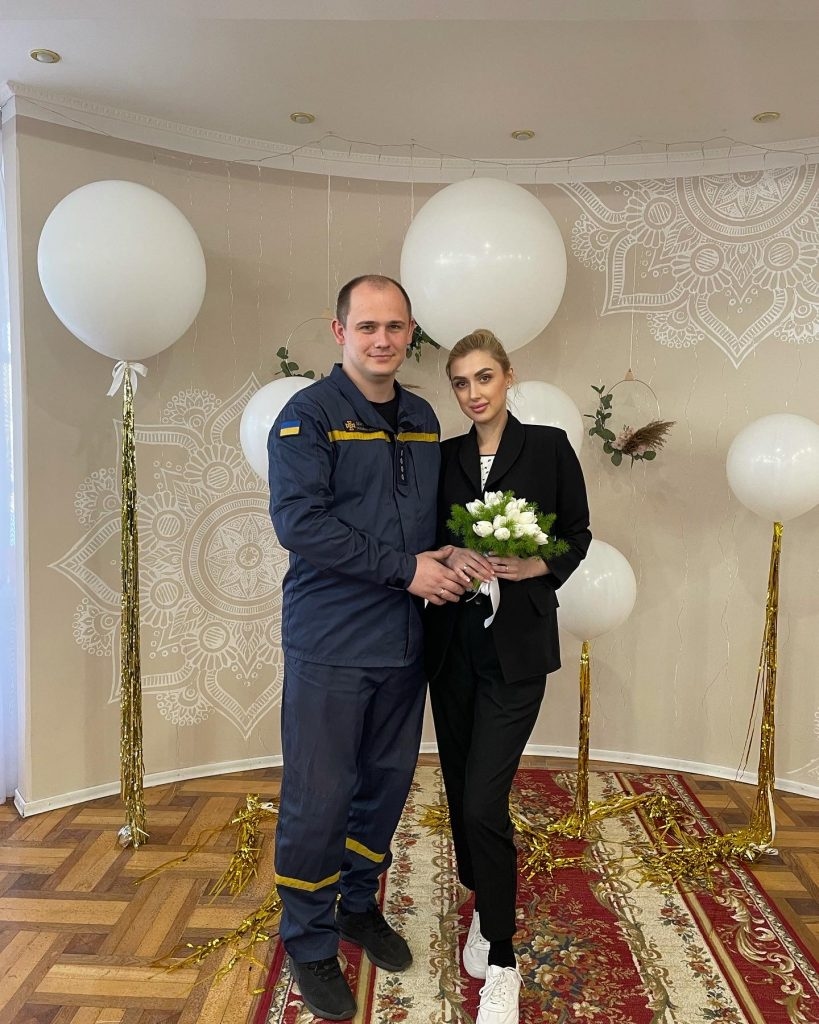Ukrainian couples celebrate love amid war

It was a beautiful wedding ceremony at the St. Michael’s monastery in Kyiv downtown.
Lit with dozens of candles, the usually crowded church was almost empty when Sviatoslav Fursin and Yaryna Arieva, both dressed in traditional Ukrainian vyshyvanka embroidered shirts, were pronounced husband and wife.
But there were no wedding bells and no celebration to follow.
The couple left the church amid the loud and terrifying air raid sirens and headed directly to the nearest bomb shelter.
It was the first day of Russia's full-scale invasion of Ukraine.
“We decided that if we die, we die together,” Fursin says.
Fursin and Arieva are among the many couples who tied the knot during Russia's war. According to the Justice Ministry's recent report, over 30,000 couples have gotten married in Ukraine since Feb. 24.
Some couples were planning their weddings before Russia’s bombings hit Ukraine and decided that the war shouldn't stop them. Others — especially those in war zones — rushed to get married after realizing that their lives could end at any moment.
As losing loved ones is now a daily possibility in Ukraine, celebrating love brings hope and joy in the country’s darkest hour.
“War is not an obstacle to love,” Fursin says.
Applause in bomb shelter
They met at a rally over two years ago. United by their love for Ukraine, Kyiv-based students Fursin, 24, and Arieva, 21, spent hours talking about politics, school work and life. Soon they started dating.
“It’s easier to list our differences than what we have in common,” Fursin says.
On Feb. 24, exactly one year before the war, Fursin proposed.
“It was quite a weird proposal,” he recalls. “We were lying at home after work, talking about different things and I offered her to marry me.”
“She said yes.”
Since the proposal was spontaneous, he didn’t have a ring at that moment. Fursin and Arieva tied red threads on each other's hands instead, as a symbol of their engagement.
Fursin says Arieva’s somewhat conservative parents were against the couple moving in together before getting married. Arieva's father is Volodymyr Ariev, a member of parliament representing the European Solidarity party. In 2020, Arieva was elected to the Kyiv City Council as a member of the same party.
They had a wedding planned for May 6. But in late 2021, as the threat of a further Russian invasion was looming over the country, the two decided to get married as soon as possible, and in case Russia does invade Ukraine, they can “live together and protect each other.”
Russia started the offensive before they were able to tie the knot. But it still didn't change their plan.
As thousands of Kyiv residents were rushing to escape the city on Feb. 24, after Russia launched the first strikes at the capital, Fursin was running around the city trying to organize their spontaneous wedding.
A priest at St. Michael’s monastery agreed to marry them.
Although they didn't agree on it beforehand, the two showed up wearing vyshyvankas, traditional Ukrainian embroidered shirts.
It was a small ceremony with only their family members and a close friend present. But it was beautiful and special, Fursin says.

They left the church under the air raid sirens and were surprised to hear everyone at the bomb shelter applauding them upon arrival.
Just like they wanted, Fursin and Arieva soon moved in together. But instead of a nicely-furnished apartment, the couple lives in a small room at a Territorial Defense unit where Fursin currently serves as a volunteer.
“It's not marriage but the war that changed us,” Fursin says. “It made our relationship stronger, but it also made her worry about me more.”
No time to hesitate
Kyiv resident Yaroslava Fedorash says she and her partner Yevhen have always been quite a “socially active couple.” Former journalist Fedorash, 28, met her future husband at a rally in Kyiv in 2020.
They started dating shortly and soon moved in together. In December, during their trip to Greece, Yevhen proposed.
They were standing by the seaside during the sunset when he pulled out a ring.
“It was all so sincere,” Fedorash recalls.
There and then, without a doubt, she said yes.
Fedorash and her future husband planned to tie the knot on April 29, the day his grandparents got married. Their 50th wedding anniversary was coming, and the two couples wanted to combine the celebrations. But the plan was shattered on Feb. 24.
Yevhen joined the Territorial Defense Forces soon after the war started, while Fedorash was volunteering for the military. She says she was crying “out of pride and worry” when he joined the force.
“I will not be ashamed to tell our kids what their parents were doing in February 2022,” she says.
Despite the new reality, the two kept wondering whether it would be possible to register their marriage during the war. One day, Fedorash accidentally found out that one registry office in Kyiv's outskirts was still operating.
She then texted Yevhen, asking about his plans for the next day, and if he could take some time off the service.
“He replied, ‘Yes, why?’ And I said that we were going to get married,” Fedorash recalls, saying that she was slightly worried waiting on his reply.
But he only asked where and at what time he should be.
They got married on March 3.

Fedorash, who wanted to get married in an elegant wedding gown, was dressed in her friend's black vyshyvanka dress. She put on red lipstick right before the ceremony to look a bit more festive. Her fiancé was wearing his military uniform.
“Now I understand that this was all so apropos,” Fedorash says. “It emphasized what we do and our views.”
Fedorash says there are many reasons for people to marry during the war. The saddest one is that a wife has more legal rights than a girlfriend when it comes to visiting hospitals, or the worst, identifying a body in the morgue.
But even thoughts about that are terrifying, she says.
Instead of focusing on the worst case scenarios, the two have started planning their shared future in the peaceful times, talking about having children soon after Ukraine's victory.
“We don’t want to celebrate our wedding as much as we want to celebrate our victory in this war,” she says.
Returning home to get married
Police officer Dmytro Kruchay from the city of Kryvyi Rih, which is now near the front line, ran into his future wife Anastasia in a local grocery store over a year ago.
The two have been inseparable since.
Kruchay, 32, says they were talking about marriage long before the war. He bought her a nice ring and proposed in October. Anastasia, 30, said yes.
But they couldn't set a date since Kruchay was almost constantly busy doing his job. And then Russia’s full-scale war began.
He was frightened after finding out about the beginning of the war. Not for himself, but for his beloved fiancée.
Anastasia's employer helped her relocate to Poland to escape the war. But she spent less than a week abroad.
One day, she called Kruchay saying she was coming back home, that she would rather be there with him, “handing him bullets,” so that they could die together “if that was meant to be.”
Soon after her return, Kruchay heard of a special simplified procedure for the military and police officers to register marriages during the war. He called Anastasia to ask if she still would want to do it and was thrilled to hear her “yes.”
On March 29, at a police unit in their native Kryvyi Rih, the head of Kruchay’s police detachment married them.

Kruchay says he didn't want to make a big deal out of it, but his colleagues still gathered to celebrate the love of their fellow officer and invited a photographer. He was happy with how it went, and so was Anastasia.
“When you go to protect your country, it is so important to know that you have someone to return to,” he says. “A small family and a place you call home.”
Postponed celebration
Feb. 26 was supposed to be one of the happiest days for Kyiv emergency service worker Oleksandr Kravchuk and his fiancée Inna.
The two were planning a small wedding for 20 guests at a restaurant in Kyiv. They had already paid for it, along with a limo, and a photographer. But in the early morning of Feb. 24, Kravchuk was urgently called to work.
Kravchuk, 27, says he was still hoping to hold their small ceremony and postponed calling it off until the last moment. Most of the guests they invited had already left Kyiv by that time.
Instead of getting married, Kravchuk spent the day with his team, extinguishing a fires that broke out in Kyiv after Russian shelling.
The couple was quite upset about the canceled celebration, but Kravchuk says he was more worried about taking Inna and her parents — who arrived in Kyiv from western Ukraine on Feb. 24 for their daughter’s wedding — out of the capital.
Around two weeks into Russia’s war, when Inna was safe in her home town of Uzhhorod, Kravchuk says that the wedding was back on his mind.
“War is war, but if we decided to get married, I figured that we should do it,” he says.

Kravchuk says the management of his department helped arrange the ceremony for him and Inna, as well as two other couples from his unit. Just like Kravchuk's family, two other couples planned to get married before the war broke out.
At lunchtime on March 23, at a local registry office in Kyiv, Kravchuk and Inna were pronounced husband and wife.
The newlyweds along with some of Kravchuk's colleagues celebrated the weddings by eating a chocolate cake at their unit. They got back to work soon after that.
For safety reasons, Kravchuk had to bring Inna back to her parents’ home in Uzhhorod the next day.
He promised her an actual celebration after the war.
“But we have to win first,” he says.









